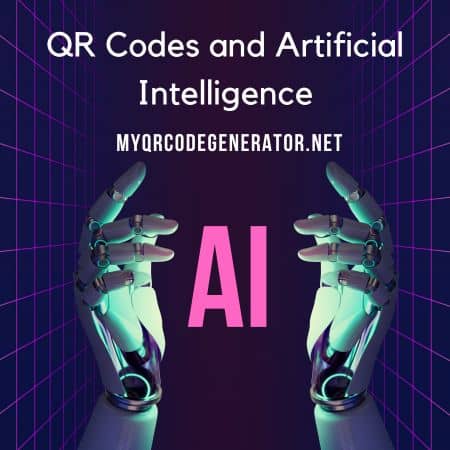In today's rapidly evolving technological landscape, the fusion of QR codes and artificial intelligence (AI) is ushering in a new era of innovation. These two technologies, each powerful in its own right, are converging to create solutions that are greater than the sum of their parts. This article aims to explore the synergies between QR codes and AI, examining their practical applications, challenges, and what the future holds.

Understanding QR Codes and AI
What are QR Codes?
QR codes, or Quick Response codes, are two-dimensional barcodes that can store a variety of data types, including text, URLs, and other information. Initially designed for tracking automotive parts, QR codes have found applications in a wide range of industries, from retail to healthcare.
Introduction to Artificial Intelligence
Artificial Intelligence, commonly referred to as AI, is a branch of computer science focused on creating intelligent machines capable of performing tasks that typically require human intelligence. This includes learning, reasoning, problem-solving, and understanding natural language.
Synergies Between QR Codes and AI
Data Collection and Analysis
One of the most compelling synergies between QR codes and AI lies in data collection and analysis. QR codes can serve as data points, which AI algorithms can then analyze to derive insights, patterns, and predictions.
Personalization and User Experience
QR codes can store personalized data, and when combined with AI, they can offer highly customized experiences. For example, scanning a QR code at a retail store could provide personalized product recommendations based on your past shopping behavior, all powered by AI.
Security and Authentication
AI algorithms can enhance the security features of QR codes. For instance, facial recognition or biometric data can be used to authenticate a transaction when a QR code is scanned, adding an extra layer of security.
Practical Applications of QR Codes and AI
Retail and Commerce
In the retail sector, QR codes and AI can work together to offer personalized shopping experiences. Scanning a QR code can trigger AI algorithms that analyze your shopping history and preferences to offer tailored product recommendations.
Healthcare and Diagnostics
In healthcare, QR codes can store patient information, while AI can analyze this data for diagnostic purposes. For example, a QR code on a patient's wristband can contain medical history, and AI can use this data to suggest treatment options.
Smart Cities and Infrastructure
QR codes and AI can be used to manage traffic, utilities, and even public safety in smart cities. Scanning a QR code can provide real-time updates on public transport, while AI can manage traffic flow to reduce congestion.
Case Studies: QR Codes and AI in Action
Inventory Management in Retail
Walmart has implemented a system where QR codes on products interact with AI algorithms to manage inventory levels efficiently. This has led to reduced operational costs and improved customer satisfaction.
AI-Powered Medical Diagnostics
Companies like Tempus are using QR codes to store patient data, which AI algorithms then analyze to provide more accurate diagnoses and treatment plans, revolutionizing personalized medicine.
Traffic Management in Smart Cities
In cities like Singapore, QR codes and AI are being used in tandem to manage traffic and reduce congestion. QR codes provide data on vehicle numbers and types, and AI algorithms optimize traffic light timings accordingly.
Challenges and Ethical Considerations
Data Privacy and Security
While the combination of QR codes and AI offers immense benefits, it also raises concerns about data privacy. Ensuring secure data storage and ethical use of personal information is paramount.
Ethical Use of AI Algorithms
The use of AI for data analysis and decision-making brings up ethical questions, especially when it comes to biased algorithms and equitable access to services.
Accessibility and Digital Divide
As QR codes and AI become more integrated into daily life, there's a risk of widening the digital divide. Ensuring that these technologies are accessible to all demographics is a significant challenge.
Future Trends: What's Next for QR Codes and AI
Integration with IoT Devices
The Internet of Things (IoT) is another technology that's set to benefit from the convergence of QR codes and AI. Imagine scanning a QR code with your smartphone to instantly configure and control smart home devices, all while AI algorithms optimize settings for energy efficiency and comfort.
Advanced Analytics and Predictive Modeling
As machine learning algorithms become more sophisticated, we can expect QR codes to play a role in more advanced analytics and predictive modeling. For instance, QR codes could be used to gather data for AI systems that predict consumer behavior, market trends, or even healthcare outcomes.
Ethical AI and Transparent Algorithms
As society becomes more conscious of the ethical implications of AI, future trends may focus on creating transparent algorithms that can be easily audited. QR codes could serve as a gateway to access this information, allowing users to understand how decisions are being made.
Conclusion
The intersection of QR codes and artificial intelligence is a hotbed of innovation, offering transformative solutions across various sectors, from retail and healthcare to smart cities. While challenges related to data privacy, ethics, and accessibility remain, the future is promising. As technology continues to advance, the synergies between QR codes and AI are likely to yield even more groundbreaking applications, setting the stage for a more interconnected, efficient, and personalized world.